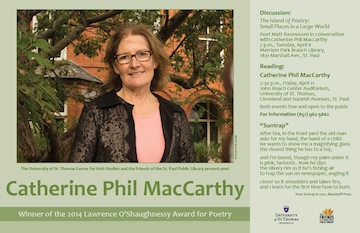The Lawrence O’Shaughnessy Award for Poetry
Catherine Phil MacCarthy was the recipient of the 18th Lawrence O’Shaughnessy Award for Poetry from the University of St. Thomas, Minnesota.
Click the image to enlarge the picture.
Citation
On April 9, 2014, the University of St Thomas Center for Irish Studies presented the eighteenth Lawrence O’Shaughnessy Award for Poetry to Catherine Phil MacCarthy in private ceremonies on the university’s St. Paul campus. The hollowing citation was read on that occasion:
No small part of the poet’s task is to keep us awake to our world, a point that the late Seamus Heaney stressed in one of his last poems when he wrote, “Had I not been awake I would have missed it.” And still another part of the poet’s task is to help us to look behind the obvious, to unsettle our usual perspectives, to chart “the way things look each day,” as the American poet Wallace Stevens once put it.
For three decades Catherine Phil MacCarthy has given her readers in Ireland and abroad fresh reasons to stay awake, and helped us to look into the unexamined spaces of Irish life. For those reasons and more, we welcome her this evening as the eighteenth recipient of the Lawrence O’Shaughnessy Award for Poetry.
We celebrate, too, the unhesitating sensuousness of her vision — a woman’s full participation in the world, which enlivens each of Catherine Phil MacCarthy’s first four collections: This Hour of the Tide from 1994, the blue globe from 1998, and Suntrap from 2007. What keeps us awake in these poems is her willingness to register desire and touch, as in “Under My Skin” from the blue globe or “Sleeping Together” from Suntrap.
From the start, MacCarthy has turned language into something both lush and precise at the same time, ranging from richly evoked memories of her Limerick childhood and of early love, to etched moments of spare clarity. Often, her poems flesh out the full layers of meaning in a simple moment that is flawlessly registered. At other times, and with the same concision, MacCarthy condenses the heartbreak of an Irish short story, in poems like “The Black Field” from This Hour of Tide or “When There’s War” from the blue globe — poems that resonate with echoing pauses.
Tonight we celebrate especially MacCarthy’s most recent and most accomplished collection: The Invisible Threshold of 2012. In these pages, as before, her poems turn our eye to subjects hard to look at, sights of which we might prefer not to speak. In ”“Overseas Mission,” for instance, she takes up the national theme of neutral Ireland’s United Nations duty and the pain that Ireland’s veterans carried home.
Her poems have a restless eye. They are filled with journeying and movement. The book opens with a poem titled “Migrant” and closes with “Storm,” in which the wind is seen
running away,
legs gathering speed, running
across the far fields to the sea.
Contemporary Ireland and its topics may be the habitation of her insight, but MacCarthy literally travels far around Europe and empathetically into the past, as in the poem “Exiles” that speaks of the Jewish seder. In the monologue “Coolacrease: Looking Back” the poet condenses the pathos of the Irish War of Independence. Looking at the present, in a poem about shopping at T. K. Maxx (our T. J. Maxx), the poet senses that “we are only real elsewhere // no longer human / in this place of stale air and artificial light.” And some views across the threshold cannot be dressed up, as in “Limbo” where a desolated, fashionable woman is “often seen alone in that field” at the grave of her unbaptized child. To repeat: “We are only real elsewhere.”
For all their journeying, MacCarthy’s poems see to it that we remain awake to how we orient ourselves in the world. Placenames, maps, the cardinal directions, and the seasons turn up in almost every poem. They help us see around the corner. They help us overhear the watchful, speaking woman of MacCarthy’s poems. We hear her steadying answer to the collapsed Celtic Tiger when she looks away from the gleam of the present:
On Lansdowne Road, right by the new stadium
cherry trees still bloom. The monumental Tiffany dome
refracts the heat of the sun, broods
over a street of Victorian redbricks
where old gardens flourish…
